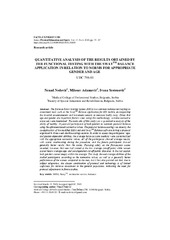Приказ основних података о документу
Quantitative analysis of the results obtained by the functional testing with the Swayᵀᴹ balance application in relation to norms for appropriate gender and age
Kvantitativna analiza rezultata dobijenih funkcionalnim ispitivanjem uz pomoć Swayᵀᴹ aplikacije za procenu ravnoteže u odnosu na norme prema odgovarajućem polu i godinama života
| dc.creator | Nedović, Nenad | |
| dc.creator | Adamović, Milosav | |
| dc.creator | Sretenović, Ivana | |
| dc.date.accessioned | 2021-06-09T14:28:49Z | |
| dc.date.available | 2021-06-09T14:28:49Z | |
| dc.date.issued | 2019 | |
| dc.identifier.issn | 1451-740X | |
| dc.identifier.uri | http://rfasper.fasper.bg.ac.rs/handle/123456789/1218 | |
| dc.description.abstract | The Balance Error Scoring System (BESS) is a common balance test relying on assessment tools such as the Sway TM Balance application for IOS mobile, encompassing the tri-axial accelerometers and movement sensors to measure bodily sway. Given that age and gender are important factors when using this methodology, suitable normative score sets were determined. The main aim of this study was a quantitative analysis of the ability of healthy, 21-year-old participants of both genders to maintain postural balance using the aforementioned normative values. The postural balance scoring was done by the co-application of the modified BESS test and Sway TM Balance software during a protocol organized in three-week double-scoring sessions. In order to assess the participants' age-and gender-dependent abilities, the average balance score medians were contextualized with the appropriate normative values. All of the participants showed average results, with scores ameliorating during the procedure, and the female participants showed generally better results than the males. Focusing solely on the first-session scores revealed, however, that men had scored at the low average cutoff point, while women scored below average age-and sex-dependent cutoff points. However, in the last session both genders scored deeply within the average. This study showed average abilities of the studied participants according to the normative values, as well as a generally better performance of the women compared to the men, but it has also pointed out that, due to subject adaptation, the chosen combination of protocol and technology is of limited usefulness for balance assessment in the general population, indicating the need for protocol adjustments in future studies. | en |
| dc.description.abstract | Sistem za ocenjivanje grešaka u ravnoteži (prema engl. Balance Error Scoring System-BESS) je uobičajen test ravnoteže koji se zasniva na alatima za procenu poput Swayᵀᴹ Balance aplikacije za IOS mobilne operativne sisteme, koja obuhvata triosne akcelerometre i senzore kretanja za merenje njihanja tela. S obzirom da su uzrast i pol važni faktori prilikom primene ove metodologije utvrđeni su odgovarajući setovi normativnih skorova. Osnovni cilj ovog istraživanja bio je kvantitativna analiza sposobnosti zdravih 21-godišnjih učesnika oba pola da održe posturalnu ravnotežu koristeći gore navedene normativne vrednosti. Ocenjivanje posturalne ravnoteže izvršeno je primenom modifikovanog BESS testa i Swayᵀᴹ Balance softvera tokom protokola organizovanog u tronedeljnim sesijama i sa dvostrukim bodovanjem. Da bi se procenile sposobnosti prema uzrastu i polu prosečni medijani rezultata ravnoteže su kontekstualizovani odgovarajućim normativnim vrednostima. Svi učesnici su pokazali prosečne rezultate sa skorovima koji se poboljšavaju tokom procedure dok su žene pokazale bolje rezultate od muškaraca. Fokusiranjem isključivo na rezultate prve sesije utvrđeno je međutim da su muškarci zabeležili nisku prosečnu tačku prekida (tzv. cut-off point) dok su žene zabeležile ispod prosečne tačke prekida u odnosu na starost i pol. Međutim, tokom poslednje sesije ispitanici oba pola ostvarili su prosečne rezultate. Ovo istraživanje je pokazalo prosečne sposobnosti ispitivanih učesnika, u odnosu na normativne vrednosti, kao i uopšteno bolje performanse ispitanica u odnosu na ispitanike. Istraživanje je takođe, ukazalo da je zbog adaptacije ispitanika, izabrana kombinacija protokola i tehnologije bila od ograničene koristi u proceni ravnoteže opšte populacije, što ukazuje na potrebu za prilagođavanjem protokola u budućim istraživanjima. | sr |
| dc.publisher | Univerzitet u Nišu, Niš | |
| dc.rights | openAccess | |
| dc.source | Facta universitatis - series: Physical Education and Sport | |
| dc.subject | BESS | en |
| dc.subject | Swayᵀᴹ | en |
| dc.subject | normative scores | en |
| dc.subject | balance | en |
| dc.subject | BESS | sr |
| dc.subject | Swayᵀᴹ | sr |
| dc.subject | normativni rezultati | sr |
| dc.subject | ravnoteža | sr |
| dc.title | Quantitative analysis of the results obtained by the functional testing with the Swayᵀᴹ balance application in relation to norms for appropriate gender and age | en |
| dc.title | Kvantitativna analiza rezultata dobijenih funkcionalnim ispitivanjem uz pomoć Swayᵀᴹ aplikacije za procenu ravnoteže u odnosu na norme prema odgovarajućem polu i godinama života | sr |
| dc.type | article | |
| dc.rights.license | ARR | |
| dc.citation.epage | 87 | |
| dc.citation.issue | 1 | |
| dc.citation.other | 17(1): 79-87 | |
| dc.citation.rank | M24 | |
| dc.citation.spage | 79 | |
| dc.citation.volume | 17 | |
| dc.identifier.doi | 10.22190/FUPES190315010N | |
| dc.identifier.fulltext | http://rfasper.fasper.bg.ac.rs/bitstream/id/187/1215.pdf | |
| dc.type.version | publishedVersion |


